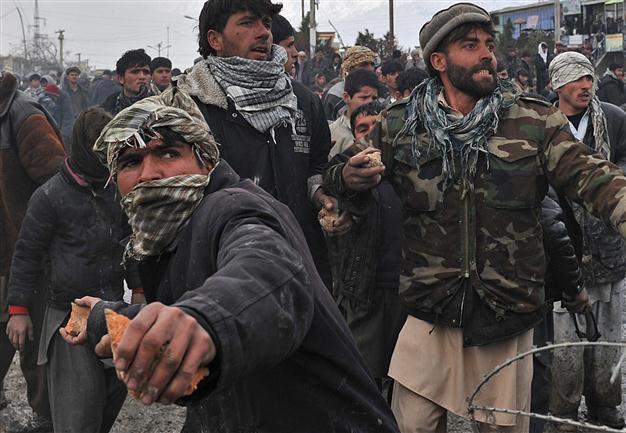Thousands besiege US base over Koran burning
KABUL - Agence France-Presse

Afghan youth throw stones toward US soldiers standing at the gate of Bagram airbase during a protest against Koran desecration at Bagram, about 60 kilometres (40 miles) north of Kabul, on February 21, 2012. AFP photo
Thousands of furious Afghans besieged a US base on Thursday, throwing rocks and climbing up the outer walls on the third day of violent protests against Koran burnings that have killed at least 12 people.
Just hours earlier, the Taliban exhorted Afghans to attack and kill foreign troops to avenge the burning of Korans at a US-run base, but stopped short of cutting off contacts with American officials in Qatar over the crisis.
Afghanistan is a deeply religious country where slights against Islam have frequently provoked violent protests, and many Afghans are incensed at the discovery of charred Korans at the US-run Bagram airbase north of Kabul.
Thousands of demonstrators besieged the base of a US-led military-civilian provincial reconstruction team (PRT) in Mihtarlam, the capital of Laghman province east of Kabul, senior police official Khalilul Rahman Niazi told AFP.
"People had come from all over Laghman. They attacked the PRT, they climbed up the walls, they set fire to something there, I think a container," he said.
Niazi said he believed two people were wounded by gunfire from the base as they stormed the walls and hurled rocks under a pall of thick black smoke.
Officials said at least three people were killed by gunfire at demonstrations in the south and east of the country Thursday, bringing the total death toll to 12 since Wednesday.
Pouncing on the opportunity to fan anti-US fires, the Taliban militia urged Afghans to "not stop" at merely protesting. The Islamist movement has been leading a 10-year insurgency against being toppled in the 2001 US-led invasion.
"You should bring the invading forces' military bases under your brave attack, their military convoys, kill them, capture them, beat them and teach them a lesson that they will never again dare to insult the Holy Koran," it said.
Yet the militia's main spokesman, Zabiullah Mujahid, told AFP late Wednesday that the Koran burning would not affect contacts with US officials in Qatar, designed to build confidence and pave the way for a prisoner exchange.
"We condemn the desecration of the Holy Koran in the strongest terms, but this issue will not affect this process in Qatar," he said.
Afghan President Hamid Karzai called for calm as the Koran incident is investigated by the US-led NATO force, and ordered his own security forces to avoid violence and protect people's lives and property.
But demonstrations flared Thursday in the capital Kabul, Jalalabad and Kunar in the east, the northern provinces of Takhar and Baghlan, Faryab in the northeast and Uruzgan in the south.
"These foreigners are always repeating their desecrating acts, and only apologise over the incident," said Mohammad Islam, a 25-year-old demonstrator in the southeastern Kabul suburb of Bagrami.
"They should prosecute those who were involved over the incident, to be a lesson for others not to commit such crimes in the future." The Afghan interior ministry blamed at least one of Wednesday's deaths on "foreign guards of Camp Phoenix", a US military base in Kabul attacked by protesters, but most were attributed by local officials to clashes with police.
US officials have apologised repeatedly for the burning of the Korans, which were sent to an incinerator pit at Bagram.
NATO spokesman Brigadier General Carsten Jacobson said it was "probably an act of ignorance" but "a mistake with grave consequences".
US officials speaking on condition of anonymity told AFP the military removed Korans from a prison at Bagram because inmates were suspected of using the holy book to pass messages to each other.
The backlash over the incident is likely to continue for several more days, said Martine van Bijlert of the Afghanistan Analysts' Network.
"The demonstrations are a combination of religious outrage, pent-up frustration and groups wanting to stir trouble," she wrote in an analysis.
"It is difficult to predict how bad things will get; this will depend largely on who manages to control -- or hijack -- the expressions of anger."
